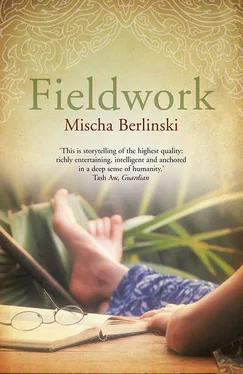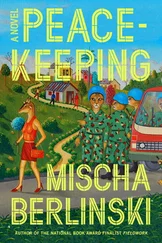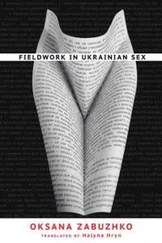"Hello?" I think I said. I wasn't taking notes.
On the other end of the line there was a woman's voice. "Mischa?" the voice said. "Mischa Berlinski? It's Karen!" She said it like back in college, we were once best friends. "Karen Leon! Martiya's friend!" the voice added.
"Karen," I said. Karen Leon was an anthropologist from Texas to whom Joseph Atkinson had suggested I write. In my e-mail I had included my phone number and invited her to call me.
"I just got back to Austin and I read your e-mail and I had to call right away . How is Martiya? I wrote her and she never wrote back, and I wrote again and I've been so worried."
A very long pause circumnavigated the world.
"Don't you know?" I said, and then I thought: How could she?
"Know what?"
"I guess you don't know."
"No," she said. Her voice dropped a register, from trumpet to trombone.
"She's dead." If she'd called in the morning, I might have been more gentle.
"Oh," Karen said. It was almost a groan.
I didn't know where to begin. "She killed herself. In jail. She ate a ball of opium."
" That killed her?"
"Yes." It didn't seem like enough. "That's what I was told."
"Well, are you sure or not?"
I felt a little defensive. "Yes, I'm sure," I said. "She's dead." "Oh."
One of my neighbor's fighting cocks crowed, and from Texas, I heard a car alarm. The sounds must have crossed each other somewhere under the Pacific.
"It's hard news," I said.
"It's just so …"
"I was shocked too," I added. It seemed like the right thing to say. "Did you know … did you know Martiya well?"
"Oh, yes. I mean, no. I mean, I haven't seen her in years. But we were once close, before …" Her voice drifted off. My neighbor's fighting cock crowed again, and a dog barked.
"Would you like to talk about Martiya sometime?" I asked. In the letter I had sent to Karen I had explained that I was a journalist interested in the story of Martiya van der Leun, but no more than that. "It's just that she had so many people who admired her here, and I want to get her story straight. I mean, maybe when you've had a little time to—" "They admire her? Really? After what happened?"
"I don't really know what happened," I admitted.
"Don't you know ? I thought that's what you were writing about."
"No, I don't know."
"I can't believe you don't know."
"I don't," I insisted.
"Martiya killed someone," Karen said. The intimate excitement had returned to her voice. "Martiya shot a missionary named David Walker. From a whole family of missionaries. She shot him in the back two times with a hunting rifle."
"Do you know why she shot him?"
There was a long pause on the line, and then Karen said, "That's why I was calling you ."
FIVE. WHAT A MURDER MEANS
THE VICTIM'S FAMILYwas easy to track down: everyone in Chiang Mai seemed to know them.
Waiting for Rachel to finish class one afternoon, I mentioned the Walkers to Mr. Tim, the headmaster at the school. Mr. Tim was a fat Canadian with a straggly beard and a nervous, high-pitched laugh who had come to Chiang Mai after leaving his wife and the walk-in closet in which he had been encaged; every morning over coffee during second-period break, he recounted to the teachers the passionate details of his love affair with a stunningly lovely but stormy transvestite accountant named Saroi. I don't know precisely the attraction to a homosexual of a man who looks like a woman, even a beautiful woman. Come to think of it, I'm not sure why a beautiful transvestite would be attracted to an obese Canadian either. In any case, Mr. Tim was a favorite of students and staff alike: kids sent to his office for discipline were allowed to help themselves from a sack of lemon candy that Mr. Tim kept in his desk; no teacher ever complained that Mr. Tim was overzealous in the examination of curricula or student progress.
" Interesting people," he said. He didn't know the Walkers himself, but his counterpart at Chiang Mai's other, better, international school, with whom he maintained a collegial contact, did. Mary Walker, a grandchild of the Walker clan, had been in the fourth grade there several years earlier. The poor child stuttered, and her folks were in his office all the time. They struck him as nice quiet people. At Thanksgiving they made him a sweet potato pie—"Heaven knows where they found sweet potatoes here !" — and that little girl, he said she was just lovely to look at. The other kids were so mean to her on account of her stutter. But there was something not right with the parents. They were very serious people. Mr. Tim's voice grew low and conspiratorial. He didn't believe that they were missionaries at all . "Somebody told me that the family actually worked for the CIA — and I believe it."
"Really!" I exclaimed.
"Oh yes!" said Mr. Tim. "Now, I don't know all the details of the story, but once, Mary got into a fight with another girl, whose father was — Persian? I think her mother was — Norwegian? Strange couple. NGO people. In any case, Mary walloped the other girl but good. The other girl deserved it. The father, this Persian man, he came into the school furious, and made some kind of silly, hot-blooded remark about Americans, and somehow this got back to the Walkers. One week later, the Thai authorities deported him. And then Mary stopped coming to class, and her parents sent the school a note saying that they had decided that Mary would do better at home. Then somebody told me that the Walkers were the last Americans to leave China after the revolution, and somebody else told me that they used to live in Burma, and, well, it just all made sense to me."
It made sense to me too.
Gunther the yoga teacher knew all about the Walkers: he, too, had heard stories. Sometimes at the end of a yoga session, Gunther's wife would bring out cups of hot ginger tea and we would sit in the gazebo, gossiping. On hearing the Walker name, he stiffened. "I haff never met them," Gunther said. "But I hear so many things. I do not like this kind of Christian who liff in a big house with so many servants, and then tell the people how they must liff. Is that for you to be Christian?" Gunther looked at me severely. I shook my head. Gunther himself lived in a big house with many servants and told many people how they must live, but it did not seem the right moment to mention that. He breathed deeply to a chakra three fingers below his belly button and continued: an Episcopalian pastor from Delaware with a bad back several years earlier had taken one of his classes, and this man, Gunther said, had known someone who had known the Walkers very well indeed. "He tells me that the Walkers give the Christians money and medicine but let the people who are not Christian alone. I do not like this spirit so much at all. I teach yoga, luff, and compassion to everyone who come here." Gunther looked at me again. "So you still like the Walkers so much?" he said. I sipped my tea and protested meekly that I had never even met them.
From Thai and farang alike I heard stories, often improbable and sometimes mutually impossible. Our landlady, an elderly Thai who stopped by weekly to oversee the gardener, told me in a hushed whisper that she had heard that an earlier generation of Walkers had once commanded a guerrilla army of anti-Communist Christian converts in southern China: she used an unfamiliar Thai word to describe the Walkers, which, when I looked it up in the dictionary, I found meant warlord, or anyone resistant to the rule of the king, and hence outside the boundaries of civilization itself. A parent at the school had heard that they were the most generous philanthropists in the north of Thailand. According to a development worker I met by chance in a bar, they lived in ostentatious wealth offered up by pious contributors in humble clapboard churches across the Midwest. All my informants agreed that the Walkers had been in Asia a very long time, but details varied: the Walkers had lived, some said, in China; others said in Burma, in Laos, in Thailand. Nobody knew the details. Everyone seemed to have met or heard a story about a different Walker, and I couldn't keep the names straight. I was told that the Walkers were the nicest people you could hope to meet, the real salt of the earth, doing God's work; I was also told that the Walkers were opportunistic, fanatical, power-mad neocolonialists. They were at once a huge family riven by dissension, and they were close-knit. All I knew was that Martiya van der Leun shot the scion of the family two times in the back with a hunting rifle.
Читать дальше












